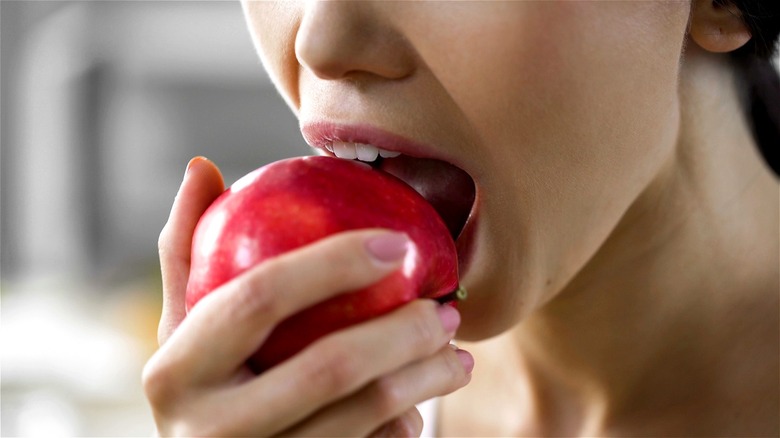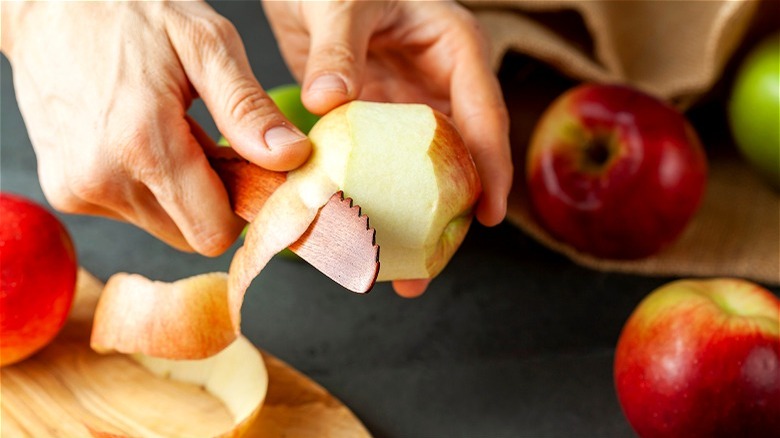The Apple Parts You May Want To Reconsider Eating
According to the USDA Economic Research Service, apples are America's favorite fruit. With all that munching and crunching, is there anything important to keep in mind?
There are some parts of an apple you shouldn't eat: Apple seeds are not recommended in high quantities, and with good reason. Medical News Today points out that apple seeds contain a compound called amygdalin that produces cyanide if they are crushed. However, research indicates that a lot of apple seeds would need to be consumed at once for the amount of cyanide produced to be considered potentially harmful (via Britannica).
Apart from the seeds, most people know that apples have many nutritional benefits including significant doses of fiber, vitamin C, potassium, and antioxidants, per Healthline. When preparing raw apples as a snack or baking them into a dish, it's part and parcel to slice, core, and peel the fruit before adding the slices next to your sandwich or tossing them into a spiced apple pie recipe. With all the peeling and cutting, is an apple's nutritional makeup retained?
Maximize apples' health benefits and avoid peeling
You may want to avoid peeling your next apple since an apple's skin contains more nutritional benefits than you might assume. The Harvard T.H Chan School of Public Health claims apple skin carries most of the fruit's flavonoids like quercetin and pectin which have been found to stop certain types of cancer cells from growing in the human body, according to one 2016 study in the Journal of Food and Drug Analysis.
In a study published in the Journal of Agricultural and Food Chemistry, scientists linked the antioxidant compounds of flavonoids and phenolics to an apple's skin, finding that the skin alone had more health-promoting antioxidants than both the skin and fruit combined. On a more basic level, the USDA notes an unpeeled apple has at least a quarter more of both potassium and vitamin A and nearly double the amount of fiber compared to its peeled counterpart (per The Washington Post).
If you need some reasons to drink apple cider, it retains most of the apples' "polyphenol compounds" due to the cider-making process (per American Institute for Cancer Research). Yates Cider Mill in Michigan grinds whole apples (peel and all) into a chunky sauce and presses the thick paste through several layers of mesh to produce the sweet, nutrient-rich liquid. Next time you reach for that apple peeler, consider all the nutritional benefits you gain by enjoying apples right off your counter, baked unpeeled, or pressed into a nutritious fall favorite drink.
Reconsider throwing out those apple cores too
Now that you know to avoid peeling apples, there's one more piece of information you may want to keep in your back pocket. According to one 2019 study published in Frontiers in Microbiology, apples contain roughly 100 million immune-supporting bacteria cells. When you discard the core, you throw away most of those cells since the majority lives in the seeds, stem, and base of the apple known as the calyx (per TODAY). Yet, why are those cells so important?
According to the Harvard T.H. Chan School of Public Health, every individual has their own unique microbiota growing and living within their body. In order to protect the good, immune-fighting bacteria, eating prebiotic foods like garlic and bananas and probiotic foods such as yogurt and kimchi can increase the strength of the immune-building bacteria located within your gut.
Beyond saving the skin, you may want to think about throwing back an apple core or two every now and then. While you may have enjoyed eating apples every day since you were a child, you can now think twice before discarding certain parts.


